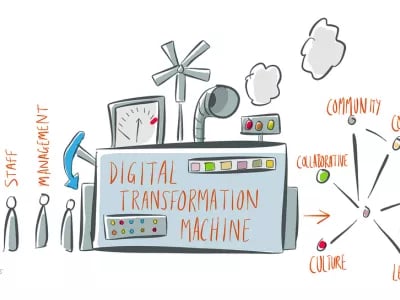Increasingly, businesses are faced with a huge challenge: transforming themselves from a business that makes use of data into a business that is fully data-driven. A team of consultants of the Boston Consulting Group led by Senior Partner & Managing Director Antoine Gourévitch examined how best to go about that transformation. The greatest pitfall for companies: wanting to do too much at once.
Measured in terms of global market capitalisation, only one data-driven organisation featured in the top 5 in 2004: Microsoft. Today, that same top 5 is made up of data-driven businesses only: Apple, Alphabet, Microsoft, Amazon and Facebook. This spotlights a significant trend: tomorrow’s successful business models do not just use data, instead, they are built on – big – data. And that necessitates, as many CEOs are finding out, more than mere incremental tweaks to their existing business models.
Many businesses are hampered by legacy IT systems that are often already overburdened as it is. The idea that those systems should be able to cope with data streams that are between ten to a hundred times greater is not realistic. The real question therefore is: how do we build the business of tomorrow without endangering that of today?
Guided by this question, consultants from the Paris office of the Boston Consulting Group examined the best way of shaping a ‘data transformation’. Their conclusion: start with small pilot projects, use the experience (and the revenue) they provide to develop an organisation-wide plan and then roll it out internationally. This three-step approach has been found to offer a significantly greater chance of success than what the authors refer to as a “system-wide overhaul”.
Change management is crucial
In a position paper based on this research, the authors discuss the success factors for each phase in detail. In the first phase, for instance, it is essential to identify low-hanging fruit: (sub)processes that can be digitised comparatively easily and that – once they are data-driven – immediately start paying back. Sales support or supply chain management are traditional areas that often feature these types of processes.
Once the first learnings have been harvested, a start can be made, in parallel to the first step, on the second phase: developing a road map for an organisation-wide transformation. The key questions are: which functions/units profit most from digitisation and where are the greatest barriers to be found? In which systems do we need to invest to make high-quality data analytics possible within each segment of the business? And how can we best frame and communicate the envisaged transformation?
Only when a detailed, properly substantiated road map (including prioritisation and phasing) is in place, enhanced by the experience acquired in the course of the pilot projects, will a business be ready, in the authors’ view, for the real step: the introduction of fully digital, data-driven processes and working methods throughout the organisation. This stage calls for strong leadership, as employees will need to abandon engrained patterns and traditional silo-based thinking. The authors therefore caution that a data-driven culture cannot be achieved from one day to the next. “[It takes] a change management program to embed new mindsets, behaviors, and ways of working,” the researchers state.
Talent and skills
The Boston Consulting Group has developed a build-operate-transfer model for businesses that are unsure of their ability to successfully drive this transformation. It offers, the authors claim, effective guidance on several crucial steps, such as defining new roles (including governance), building a ‘data-first culture’, introducing ‘agile’ ways of working and recruiting and cultivating the required talent and skills.
In any case: for continued success in tomorrow’s world, businesses have no choice but to start on their digital transformation today, according to lead researcher Antoine Gourévitch in his postscript. Following the right path is crucial. “This contest will not be won by making huge bets. The winners will be agile, pragmatic, and disciplined. They will move fast and capture quick wins, but they will also carefully plan a transformation roadmap to optimize performance in the functions and operations that create the most value, while building the technical capabilities and resources to sustain the transformation,” says Gourévitch.
Would you like to read more? Here you will find the article of the Boston Consulting Group



.jpg?width=448&height=200&name=cybersecurity-privacy-protect-data%20(1).jpg)









